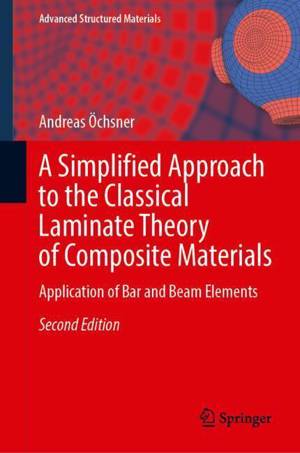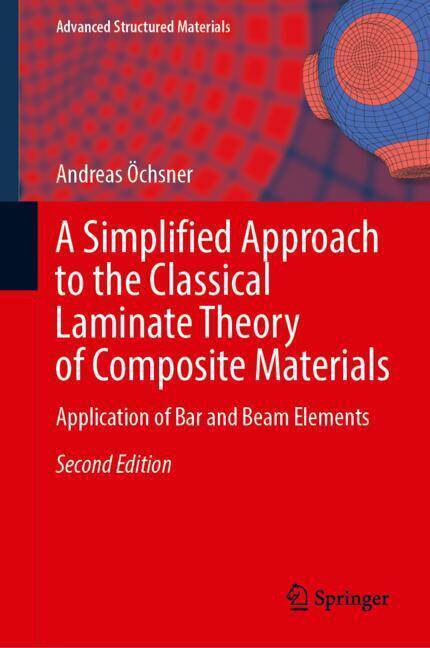
- Retrait gratuit dans votre magasin Club
- 7.000.000 titres dans notre catalogue
- Payer en toute sécurité
- Toujours un magasin près de chez vous
- Retrait gratuit dans votre magasin Club
- 7.000.0000 titres dans notre catalogue
- Payer en toute sécurité
- Toujours un magasin près de chez vous
A Simplified Approach to the Classical Laminate Theory of Composite Materials
Application of Bar and Beam Elements
Andreas ÖchsnerDescription
This book provides a systematic introduction to composite materials, which are obtained by a layer-wise stacking of one-dimensional bar/beam elements. Each layer may have different mechanical properties, but each single layer is considered as isotropic. The major idea is to provide a simplified theory to easily understand the classical two-dimensional laminate theory for composites based on laminae with unidirectional fibers. In addition to the elastic behavior, failure is investigated based on the maximum stress, maximum strain, Tsai-Hill, and the Tsai-Wu criteria.
Partial differential equations lay the foundation to mathematically describe the mechanical behavior of any classical structural member known in engineering mechanics, including composite materials. The so-called classical laminate theory provides a simplified stress analysis, and a subsequent failure analysis, without the solution of the system of coupled differential equations for the unknown displacements. The procedure provides the solution of a statically indeterminate system based on a generalized stress strain relationship under consideration of the constitutive relationship and the definition of the so-called stress resultants. This laminate theory is typically provided for two-dimensional plane problems, where the basic structural element is a simple superposition of a classical plane elasticity element with a thin plate element under the consideration of an orthotropic constitutive law.
This two-dimensional approach and the underlying advanced continuum mechanical modeling might be very challenging for some students, particularly at universities of applied sciences. Thus, a reduced approach, the so-called simplified classical laminate theory, has been developed. The idea is to use solely isotropic one-dimensional elements, i.e., a superposition of bar and beam elements, to introduce the major calculation steps of the classical laminate theory. Understanding this simplified theory is much easier and the final step it to highlight the differences when moving to the general two-dimensional case.
Spécifications
Parties prenantes
- Auteur(s) :
- Editeur:
Contenu
- Nombre de pages :
- 160
- Langue:
- Anglais
- Collection :
- Tome:
- n° 242
Caractéristiques
- EAN:
- 9783031980510
- Date de parution :
- 29-10-25
- Format:
- Livre relié
- Format numérique:
- Genaaid
- Dimensions :
- 155 mm x 235 mm

Les avis
Nous publions uniquement les avis qui respectent les conditions requises. Consultez nos conditions pour les avis.






